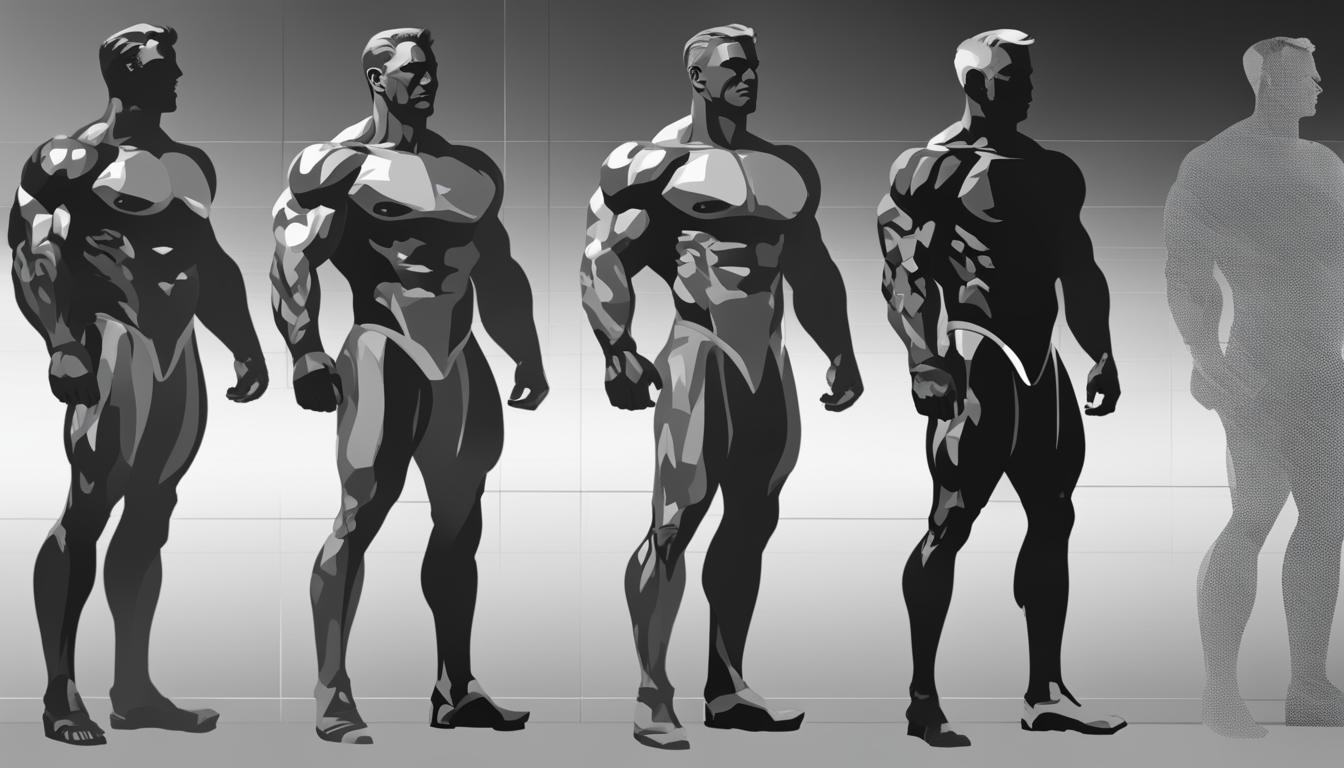At our clinic, we understand the importance of testosterone replacement therapy (TRT) in addressing the symptoms of low testosterone levels. Many men wonder about the optimal age to start TRT and the benefits it can provide at different stages of life. In this article, we will explore the age factors to consider when it comes to TRT and shed light on the benefits that can be gained at each age.
Key Takeaways:
- Testosterone replacement therapy (TRT) is recommended for men experiencing symptoms of low testosterone and diagnosed deficiency.
- The optimal age to start TRT varies depending on individual circumstances.
- TRT can provide benefits such as improved energy levels, mood, libido, and muscle mass.
- It is important to discuss the potential risks and benefits of TRT with a healthcare professional to determine the appropriate age to start therapy.
- Regular monitoring and follow-up appointments are essential to ensure the effectiveness and safety of TRT.
Factors Influencing Testosterone Levels
Testosterone levels naturally decline as men age. This age-related decline in testosterone is known as andropause or male menopause. It is a natural process that occurs due to various factors, including:
- Age: Testosterone production typically starts to decline after the age of 30.
- Genetics: Some individuals may have a genetic predisposition to lower testosterone levels.
- Lifestyle: Certain lifestyle factors such as poor diet, lack of exercise, obesity, excessive stress, and inadequate sleep can contribute to lower testosterone levels.
- Medical conditions: Certain medical conditions, such as hypogonadism, diabetes, obesity, and chronic stress, can also impact testosterone production.
Fortunately, hormone replacement therapy for men, such as testosterone replacement therapy (TRT), can help mitigate the effects of age-related testosterone decline. TRT involves replacing or replenishing testosterone levels through various methods, including injections, gels, patches, or pellets. By restoring testosterone levels to a more optimal range, TRT can help improve energy levels, mood, libido, muscle mass, and overall quality of life.
In conclusion, understanding the factors that influence testosterone levels is crucial in addressing age-related testosterone decline. Hormone replacement therapy for men, such as TRT, can be an effective treatment option to restore testosterone levels and alleviate the symptoms associated with low testosterone. It is important to consult with a healthcare professional to determine if TRT is the right choice and to discuss the potential risks and benefits based on individual circumstances.
Quotes:
As men age, it is natural for testosterone levels to decline. This can lead to various symptoms and impact overall well-being. Hormone replacement therapy, such as testosterone replacement therapy, can help restore testosterone levels and improve quality of life for aging men.
“Testosterone replacement therapy is an effective option for men experiencing symptoms of low testosterone due to age-related decline. It can help restore hormone levels and improve energy, mood, and sexual function,” says Dr. Smith, a renowned expert in hormone therapy.
Additional Explanation:
In addition to age, other factors that can influence testosterone levels include genetics, lifestyle, and medical conditions. Genetic factors can play a role in determining an individual’s baseline testosterone levels and their propensity for age-related decline. Lifestyle factors such as poor diet, lack of exercise, and excessive stress can contribute to lower testosterone levels. Medical conditions such as hypogonadism, obesity, and chronic stress can also impact testosterone production. By addressing these factors and considering hormone replacement therapy, men can take steps to optimize their testosterone levels and improve their overall well-being.
Signs and Symptoms of Low Testosterone
As men age, it is not uncommon for testosterone levels to naturally decline. This decline in testosterone, also known as andropause or male menopause, can lead to a variety of symptoms that can significantly impact a man’s quality of life. Recognizing these signs and symptoms is crucial in determining the need for testosterone replacement therapy (TRT).
One of the most common symptoms of low testosterone is fatigue. Men who have low testosterone levels often experience a lack of energy and motivation, making it difficult to perform everyday tasks and activities. Reduced sex drive and erectile dysfunction are also common symptoms of low testosterone. These issues can negatively affect a man’s intimate relationships and overall satisfaction.
Other signs of low testosterone include a decrease in muscle mass and strength, increased body fat, mood changes such as irritability and depression, and cognitive difficulties like poor concentration and memory loss. These symptoms can have a significant impact on a man’s overall well-being, leading to decreased self-esteem and a decline in overall quality of life.
Recognizing the signs and symptoms of low testosterone is essential in addressing the issue and considering testosterone replacement therapy as a treatment option.

At What Age Should You Consider Testosterone Replacement Therapy?
When it comes to considering testosterone replacement therapy (TRT), age is an important factor to take into account. While there is no specific age requirement for starting TRT, it is generally recommended for men who have clinically low testosterone levels and are experiencing symptoms that significantly affect their well-being. The decision to start TRT should be made in collaboration with a healthcare professional, who will evaluate an individual’s symptoms, medical history, and hormone levels.
TRT is typically considered for men who are experiencing symptoms of low testosterone, such as fatigue, reduced sex drive, erectile dysfunction, and decreased muscle mass. These symptoms can greatly impact a man’s quality of life and overall well-being. If clinically low testosterone levels are confirmed through blood tests, TRT may be a suitable option to restore hormone levels and alleviate these symptoms.
It is important to note that the optimal age to start TRT can vary depending on individual circumstances. Factors such as overall health, lifestyle, and personal goals should be taken into consideration. A thorough discussion with a healthcare provider is crucial to determine the appropriate time to consider TRT and whether the potential benefits outweigh the risks.
Considering Testosterone Replacement Therapy: Points to Remember
- The decision to start TRT should be made in collaboration with a healthcare professional.
- TRT is generally recommended for men with clinically low testosterone levels and significant symptoms.
- Age is an important factor, but individual circumstances, overall health, and personal goals should also be considered.
- Regular monitoring and follow-up appointments are essential to ensure the therapy is effective and safe.
When considering TRT, it is important to have a comprehensive evaluation of your symptoms, medical history, and hormone levels. This will help determine whether starting testosterone replacement therapy is the right choice for you and at what age it should be initiated. Consulting with a healthcare professional who specializes in hormone therapy for men will provide the necessary guidance and support throughout your journey. See more here: testosterone replacement therapy age or you can ask us about the optimal age for testosterone replacement therapy in Tampa or US.
Testosterone therapy benefits by age – 30, 32, and when to start testosterone replacement therapy?
Benefits and Risks of Testosterone Replacement Therapy
Testosterone replacement therapy (TRT) can offer several benefits for men who have diagnosed testosterone deficiency and symptoms that significantly impact their well-being. It is important to note that the decision to pursue TRT should be made in consultation with a healthcare professional, who will assess individual circumstances, symptoms, and testosterone levels to determine the best course of action.
One of the primary benefits of TRT is the potential to improve energy levels and overall mood. Many men who undergo TRT report increased vitality and a reduction in fatigue. Additionally, TRT has been shown to enhance libido and sexual function, providing a renewed sense of intimacy and satisfaction.
TRT can also have positive effects on cognitive function and muscle mass. Some studies suggest that TRT may improve memory, concentration, and overall mental sharpness. In terms of physical health, TRT has been found to aid in the development and maintenance of lean muscle mass, leading to increased strength and improved body composition.
Testosterone replacement therapy age
While TRT can offer significant benefits, it is important to be aware of the potential risks and side effects. Common risks associated with TRT include acne, fluid retention, and sleep apnea. It is also important to monitor for breast enlargement, as this can be a sign of an imbalance in hormone levels. Additionally, there have been concerns about an increased risk of prostate cancer in men undergoing TRT, although the data on this topic is still inconclusive.

Monitoring and Adjusting Testosterone Replacement Therapy
Once testosterone replacement therapy (TRT) is initiated, regular monitoring is essential to ensure the therapy is effective and safe. Monitoring involves conducting blood tests to assess testosterone levels and determine if adjustments to the treatment plan are needed. The frequency of these tests may vary depending on individual circumstances and goals of therapy. Regular follow-up appointments with a healthcare provider are crucial for optimizing the benefits of TRT.
During follow-up appointments, your healthcare provider will review your symptoms, assess your hormone levels, and evaluate your overall progress while on TRT. This ongoing monitoring helps ensure that the therapy is achieving the desired results and that any potential issues are identified and addressed promptly.
In addition to assessing hormone levels, your healthcare provider may also evaluate other laboratory markers, such as cholesterol and prostate-specific antigen (PSA) levels. These tests help provide a comprehensive picture of your overall health and assess any potential risks associated with TRT.
Based on the results of these tests and your individual response to TRT, your healthcare provider may make adjustments to your treatment plan. This may involve modifying the dosage, changing the medication formulation (such as switching from injections to gel or patches), or altering the frequency of administration. The goal is to find the optimal balance of testosterone levels that effectively alleviates symptoms while minimizing any potential side effects.
Some other questions about TRT in Tampa – What AGE
testosterone replacement therapy for older men, at what age should you consider testosterone replacement therapy, testosterone replacement therapy for aging men, best age for testosterone replacement therapy, hormone replacement therapy for men.
Summary:
- Regular monitoring of hormone levels is necessary once TRT is initiated.
- Blood tests are used to assess testosterone levels and determine if adjustments to the treatment plan are needed.
- Follow-up appointments with a healthcare provider are essential for optimizing the benefits of TRT.
- Additional laboratory markers, such as cholesterol and PSA levels, may be evaluated to assess overall health and potential risks.
- Your healthcare provider may make adjustments to your treatment plan based on test results and individual response to TRT.
Conclusion
Testosterone replacement therapy (TRT) is a safe and effective treatment option for men with diagnosed testosterone deficiency and symptoms that significantly impact their well-being. When considering TRT, it is important to consult with a healthcare professional who can evaluate individual circumstances, symptoms, and testosterone levels to determine the appropriate course of action.
Regular monitoring and follow-up appointments are essential to ensure the therapy is providing the desired benefits and is safe for long-term use. Through blood tests and close observation, healthcare providers can make adjustments to the treatment plan as needed, ensuring optimal hormone levels and overall well-being.
TRT, including TRT injections, can bring significant improvements in energy levels, mood, libido, and overall quality of life for aging men. If you are interested in learning more about hormone therapy for men and how TRT injections could benefit you, please don’t hesitate to contact us at 727-456-8686 or visit our website at invigorate-wellness.com. We are here to support you on your journey to better health and vitality.
FAQ
What is the optimal age to start testosterone replacement therapy?
The optimal age to start testosterone replacement therapy varies depending on individual circumstances. It is generally recommended for men who are experiencing symptoms of low testosterone and have a diagnosed deficiency.
What factors contribute to the age-related decline in testosterone?
The age-related decline in testosterone, also known as andropause or male menopause, can be influenced by factors such as age, genetics, lifestyle, and medical conditions.
What are the signs and symptoms of low testosterone in aging men?
Common signs and symptoms of low testosterone include fatigue, reduced sex drive, erectile dysfunction, decreased muscle mass and strength, increased body fat, mood changes, and cognitive difficulties.
At what age should you consider testosterone replacement therapy?
The decision to start testosterone replacement therapy should be based on a thorough evaluation of an individual’s symptoms, medical history, and testosterone levels. It is generally considered for men who have clinically low testosterone levels and are experiencing symptoms that significantly affect their well-being.
What are the benefits and risks of testosterone replacement therapy?
Testosterone replacement therapy can provide benefits such as improved energy levels, mood, libido, cognitive function, and muscle mass. However, it is important to consider the potential risks, including acne, fluid retention, sleep apnea, breast enlargement, and an increased risk of prostate cancer.
How is testosterone replacement therapy monitored and adjusted?
Once testosterone replacement therapy is initiated, regular monitoring of hormone levels is necessary to ensure its effectiveness and safety. Blood tests can be used to assess testosterone levels, and adjustments to the treatment plan may be made based on the results.
What is the conclusion regarding testosterone replacement therapy?
Testosterone replacement therapy is a viable option for men with diagnosed testosterone deficiency and symptoms that significantly impact their well-being. The decision to start therapy should be made in collaboration with a healthcare professional, and regular monitoring and follow-up appointments are crucial to optimize the benefits of treatment.

